
Eight Years After Their Introduction
Chinese Buses Witness the Ins and Outs of the Syrian War

These green buses have witnessed various events and details of everyday life in Syria since their arrival in 2008, from the suffocating traffic of Damascus to the cries of the injured being evacuated from Aleppo. The buses have withstood the congestion of rush hours and the pounding footsteps of regime and pro-regime militia fighters.
The Syrian regime has used all its resources during the years of the revolution to confront its people. The regime did not even spare public transport buses, which became accomplices in the regime’s war on Syrians. The regime used these buses to transport soldiers, turned them into mobile torture chambers for protestors and has now turned the buses into a symbol of forced displacement. The buses have even become part of the psychological war waged by pro-regime media
In 2008, Damascus was promised 600 new buses for public transport. The buses were imported from China and arrived three years late. The Syrian government had signed a 30 million US dollar deal with a company, “Zhejian Timis”, in 2005 but the project faced funding problems, which delayed delivery of the buses. The “President” bridge in Damascus was widened to provide space for the new buses, which could transport up to 80 passengers, and the deal between the Syrian and Chinese Ministries of Transport was conducted with great optimism and promises of improving the appearance of Damascus’ streets.
After their arrival in Syria, the green “King Long” buses became popular among users, who figured out how to use the white ticket specially printed for the buses two or three times over, although the price of a ticket at the time was only 10 Syrian pounds. The buses provided cheap and accessible transport for a wide segment of the population and threatened the “Service” (mini-bus) business. The government’s announcement that it would import more buses provoked service drivers to take to the streets in protest.
In 2009, the Syrian government mandated the General Company for Public Transport to announce a public offer to buy 1000 buses that run on gas for use in Damascus. The year 2010 witnessed an increase in the number of buses imported from China, 150 of them destined for Damascus alone. The government promised to remove the “Service” mini-buses from use entirely in Damascus with the number of green buses in Damascus reaching 1000.
In 2011, with the start of the Syrian revolution, the green buses began to be used not only for inner city transport but also between cities and provinces. The buses were no longer used only for ordinary passengers but also for transporting regime soldiers between military bases and to the frontline to attack cities. During the peaceful protests that erupted in various Syrian cities, the security forces transformed the buses into spaces to torture detainees before transporting them to security centers, an issue that is well-documented by activists.
During the first two years of the Syrian revolution, the public transport sector incurred large losses, which, according to the manager of the General Company for Public Transport, led to 90% of the company’s buses being out of service. The manager of the transport sector in the Damascus region promised that 150 of the damaged buses would be fixed by the end of 2013.
On 23 May 2014, the buses’ function changed once again as the Syrian regime began to use them to evacuate besieged residents and fighters from the old neighborhoods of Homs city and transport them to its northern countryside. The evacuation came after an agreement was reached, which stipulated that opposition fighters and any residents who wanted to would leave before the regime forces regained control of the neighborhoods. The green buses became the symbol and national sponsor of all subsequent evacuations.
According to the regime’s official statistics, the number of public transport buses fell from 928 in 2011 to around 500 in 2014, falling to less than 50 in 2015. The decrease is connected to the buses being worn out in military operations over the past two years.
This decrease in the number of buses comes at a time when the regime is becoming more and more dependent on the “multi-purpose Chinese buses”, forcing it to increase the number of buses belonging to the General Company for Public Transport. The regime struck a new deal with China in 2015 to import 200 new buses.
With the increase in agreements between the regime and opposition in Syria, the green bus became the symbol of forced displacement of Syrians in 2015, especially after the buses transported hundreds of families from Daraya, Modhamiyyat al-Sham Qudsiyya and al-Haama to Idlib’s countryside. The buses became part of the psychological warfare conducted by pro-regime media outlets. One of the reporters on the Iranian al-Alam channel, Hussein Mortadha, appearing in footage driving one of the green buses in al-Sheikh Saeed neighborhood in south-eastern Aleppo, to show how the regime was advancing in opposition areas.
Today, the green buses wait in Aleppo to evacuate thousands of residents who have been besieged for around three months to Aleppo’s western countryside and Idlib’s countryside. The passengers pay for their fare with their homes and five years of continuous bombardment and resistance, boarding buses that move only by decision of pro-regime militia snipers.
if you think the article contain wrong information or you have additional details Send Correction
النسخة العربية من المقال
-
Follow us :

















 A
A
A
A
A
A




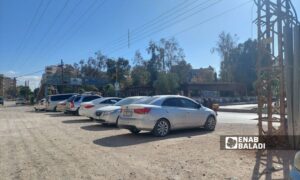
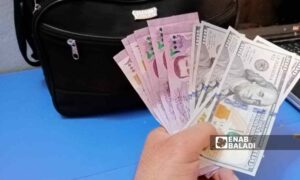
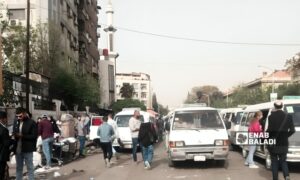
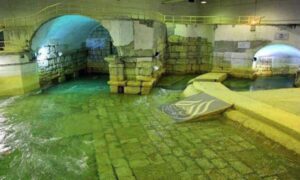
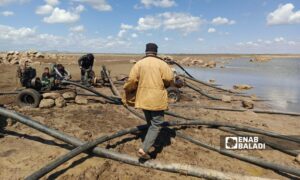
 More Economy
More Economy